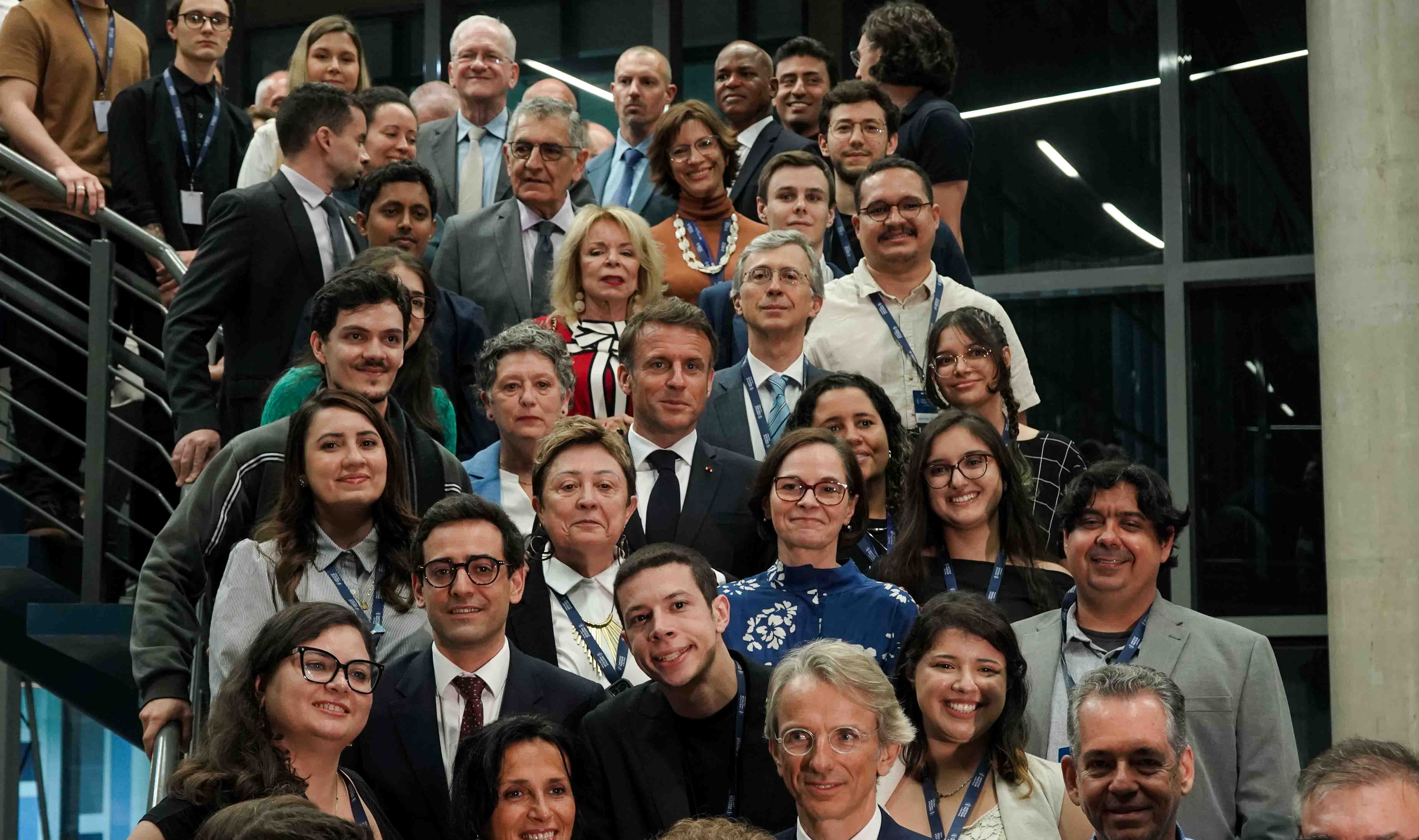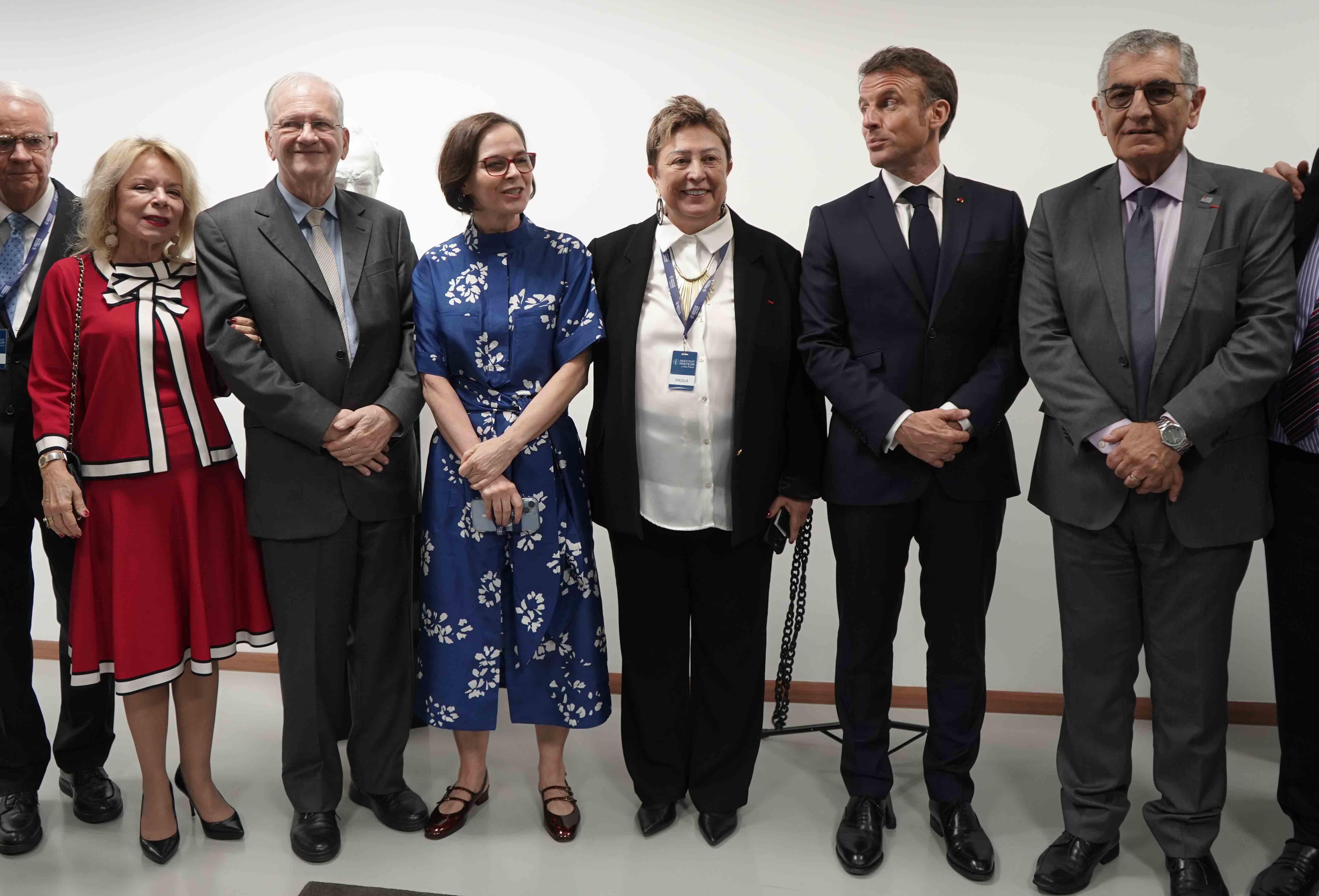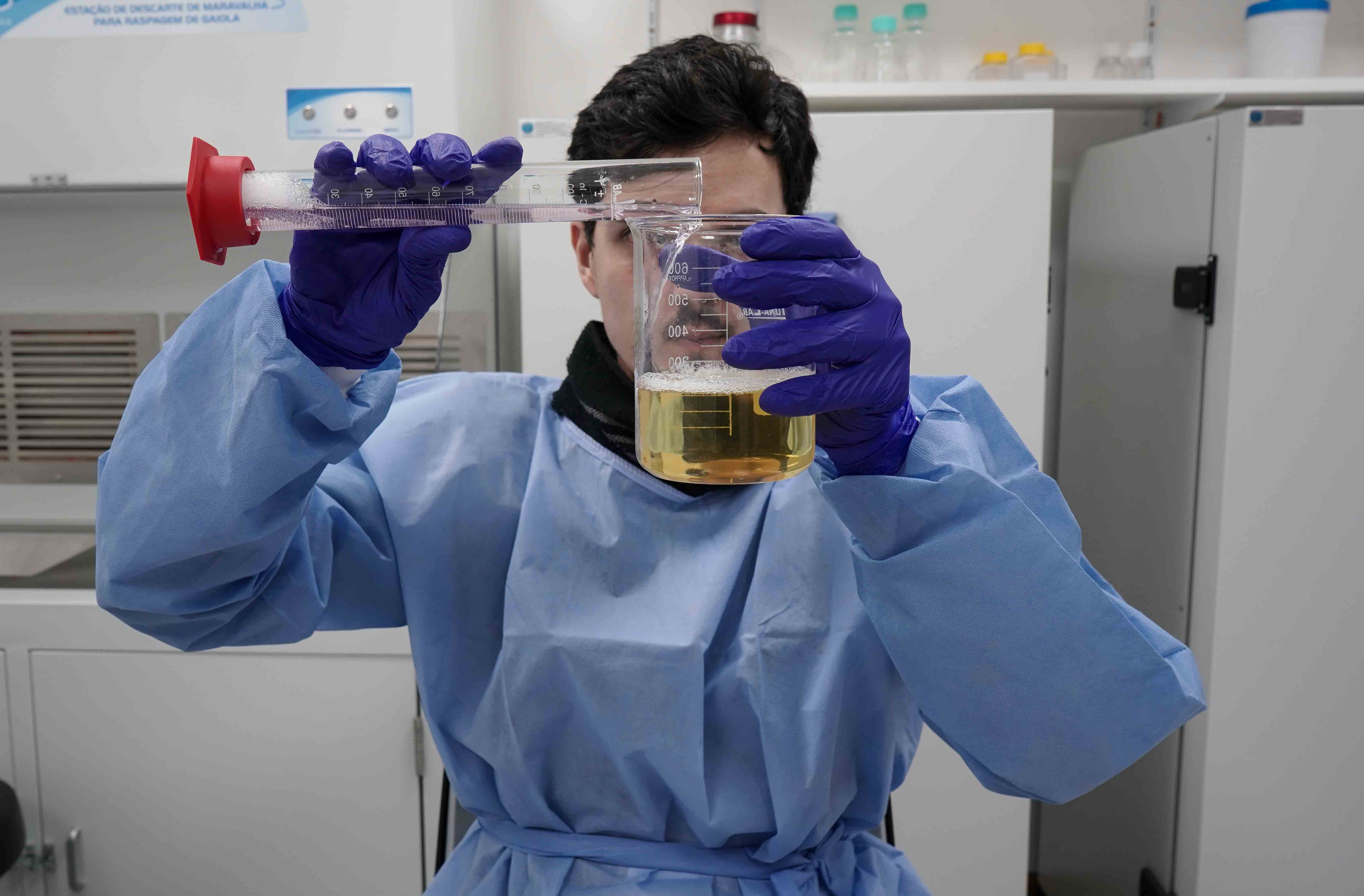

In his first-ever official visit to Brazil, Macron met with young researchers at Institut Pasteur de São Paulo (photo: Daniel Antônio/Agência FAPESP)
The new member of the Pasteur Network, which comprises 33 laboratories in 25 countries, is being equipped with the support of FAPESP, which is also funding several young researchers associated with the institute.
The new member of the Pasteur Network, which comprises 33 laboratories in 25 countries, is being equipped with the support of FAPESP, which is also funding several young researchers associated with the institute.

In his first-ever official visit to Brazil, Macron met with young researchers at Institut Pasteur de São Paulo (photo: Daniel Antônio/Agência FAPESP)
By Karina Toledo | Agência FAPESP – French President Emmanuel Macron unveiled Institut Pasteur de São Paulo (IPSP) during a visit to the city on March 27, highlighting the “profound scientific and intellectual history” of relations between France and Brazil.
“I believe research and academic ties are very important. They aren’t foreign to the political period. There's a very profound scientific and intellectual history between our two countries, as evidenced by today’s ceremony [...] and this great opening-up under President Lula [...] [The work] you’re doing as researchers and professors in partnership with other laboratories affiliated with the Pasteur Network is more solid than the vicissitudes of time. Fortunately [...] Thank you for devoting so many years of your lives. And thank you to our Brazilian partners who are here today,” Macron said.
Located on the campus of the University of São Paulo (USP) in a 2,000-square-meter building, the newest member of the Pasteur Network has the capacity to house some 100 scientists working in 17 laboratories, four of which are Biosafety Level Three (BSL3) facilities, as well as a bioinformatics unit and several items of multiuser equipment. The team’s main research focus is the study of emerging, re-emerging, neglected and degenerative diseases, especially those capable of affecting the health of the central nervous system and neurodevelopment.
According to IPSP Executive Director Paola Minoprio, the São Paulo branch of the network will continue the work that has been done since 2017 with FAPESP’s support under the aegis of the Scientific Platform Pasteur-USP (SPPU). In July 2022, USP and the São Paulo State Government signed an agreement with France’s Institut Pasteur to convert SPPU into a full member of the Pasteur Network, which comprises 33 labs in 25 countries (read more at: agencia.fapesp.br/39155).
“The process was planned to take place in two stages: first, building up the partnership in research and training, and then, if all went well, establishing a unit of Institut Pasteur,” Minoprio told Agência FAPESP. “If we hadn’t had USP’s infrastructure, the support of Pasteur’s engineers and the partnership with FAPESP, which enabled us to equip SPPU and is enabling us to equip Institut Pasteur de São Paulo, it wouldn’t have been possible to do this in such a short time. FAPESP has been absolutely fundamental to all of it.”
“SPPU was an excellent initiative in itself, but Institut Pasteur de São Paulo really establishes the link between our two institutions,” Carlos Gilberto Carlotti Junior, Rector of USP, told Agência FAPESP in an interview that took place shortly before the plaque was unveiled. “We can use funds from both institutions, and we can pursue other ways to fund the research autonomously, as well as belonging to the Pasteur Network, which has labs all over the world. This gives the institution a fresh perspective and should lead to an increase in the number of researchers.”
The unveiling ceremony was also attended by Stéphane Séjourné, France’s Minister for Europe and Foreign Affairs, who visited the new labs and spoke with researchers and postdocs on the team. Other distinguished participants included Yasmine Belkaid, President of Institut Pasteur; Sylvie Lemmet, French Ambassador to Brazil; Yves Teyssier D’Orfeuil, French Consul General in São Paulo; Vahan Agopyan, São Paulo State Secretary for Science, Technology and Innovation; Marco Antonio Zago, President of FAPESP; Fernando Menezes, Chief Administrative Officer of FAPESP; François Romaneix, Vice Chairman of IPSP’s Board; Antoine Petit, President of Centre National de la Recherche Scientifique (CNRS), France’s largest research institution; and several leaders of USP.

Maria Arminda Arruda (Vice Rector of USP), Marco Antonio Zago, Paola Minoprio, Emmanuel Macron and Vahan Agopyan (photo: Daniel Antônioo/Agência FAPESP)
World-class research
For FAPESP President Zago, Institut Pasteur’s joining forces with USP represents a very important step in the internationalization of São Paulo state. “USP provides the physical structure, the facility to house [the researchers], and administrative support. FAPESP provides funding for the projects,” he said.
“There was a first Thematic Project, which was important to start the research [by SPPU], and a second one is in the pipeline. Another initiative is the Young Investigator Grant program, which awards significant amounts of funding – equivalent to an early-career assistant professor’s salary – as well as support for research in the shape of instruments, equipment and consumables. The youngsters who are selected by FAPESP and come to Institut Pasteur de São Paulo also receive supplementary funding from the French Institut Pasteur. All this constitutes an effective pooling of resources.”

The new institute will have 17 labs, four of which will be Biosafety Level 3 facilities (photo: Daniel Antônio/Agência FAPESP)
Institut Pasteur de São Paulo has six research lines: Integrative Biology; Ecoepidemiology, Diversity and Evolution of Emerging Viruses; Modeling of Nervous System Diseases; Trypanosomatid Infectious Processes; Vaccinology; and Clinical and Molecular Virology.
While the team were still SPPU, they published more than 90 scientific papers, including several on COVID-19 and zika syndrome. They also played a crucial role during the COVID-19 pandemic by participating in the development and testing of various diagnostic methods for the disease.
“The fact that Brazil is a biodiversity champion gives us a very substantial advantage. It enables us to appreciate the discovery of emerging pathogens that could potentially infect humans, and it also enables us to study how climate change affects the development and variability of microorganisms and the transmission of infections,” Minoprio said.
Another feature of great interest to scientists derives from the mixture of ethnicities with considerable genetic variability in the Brazilian population. “We can study an infectious process from several angles at the same time, relating to climate, microbiota – which varies depending on where people are, what they eat and so on – and genetics in order to understand how all this influences susceptibility to infections,” she explained.
In a press release issued by IPSP, Belkaid noted the close ties built by Institut Pasteur with Brazil throughout the research institution’s history. The unveiling of IPSP confirms “our strong commitment to our Brazilian partners”, she said.
“My thanks to the entire team at IPSP, and especially to the University of São Paulo and FAPESP, for their admirable work in establishing this new institute so speedily.
“To respond to today’s new global challenges, it is essential to study the impact of climate change on health and the conditions for novel pathogens to emerge. The scientific community must commit to a pluralistic and collective approach by creating multidisciplinary and international institutions.”
Republish
The Agency FAPESP licenses news via Creative Commons (CC-BY-NC-ND) so that they can be republished free of charge and in a simple way by other digital or printed vehicles. Agência FAPESP must be credited as the source of the content being republished and the name of the reporter (if any) must be attributed. Using the HMTL button below allows compliance with these rules, detailed in Digital Republishing Policy FAPESP.





